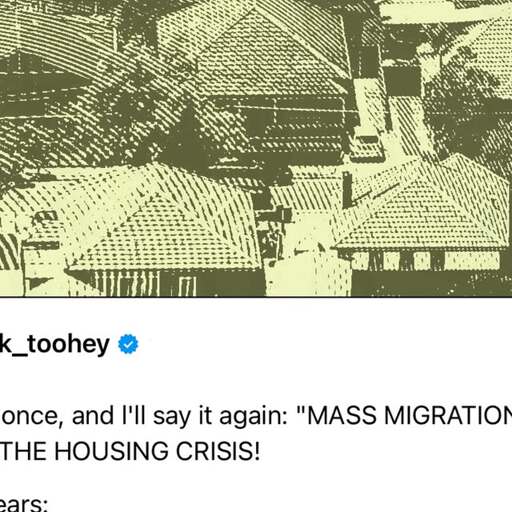



Speculation has outpaced supply
That’s the TL;DR. Not that we didn’t already know, but nice to see it confirmed (yet again).
Now do actual number of people per dwelling over the same time period
Ok so if the number of dwellings has increased at the same rate as the population has grown, why is it so hard to find somewhere to rent?
I’m not saying the numbers are wrong, I just don’t understand why there’s a shortage.
Same as every other place I assume. Rich fucks buying up property as investments.
This shit is happening everywhere. Even in India housing prices are astronomical. Some places in Mumbai are as expensive as New York while the median income is nowhere near that.
That doesn’t create a shortage of rentals though.
What do you think “property” is in this context?
They are buying homes and not renting them out. Holding them as an investment and/or making money off them on Airbnb.
Why would you buy a home and not rent it out?
AirBnB isn’t helping but it’s well established that it’s not a significant driver of the problem.
If its just a speculative asset to be traded back and forth you dont want the extra hassle of managing renters.
Houses aren’t a speculative asset like shares or gold. They take time and effort to sell, and it’s costly.
Point is, you wouldn’t intend to sell in less than several years. Rent might be $50k a year. No investor is leaving that on the table.
I had a quick search, this isn’t something I’ve properly looked into, but empty homes can be valuable:
Speculative real estate investment can lead to homes being left vacant for quite long periods of time, as in some cases this helps to preserve their condition for resale and saves the investor from having to shell out for upkeep and maintenance. In cities with high-value real-estate like Melbourne, Sydney, New York and London, housing prices have risen much faster than wages, and many investors know that simply buying and holding property can be a more effective investment strategy than buying to rent. As Karl Fitzgerald of the Australian non-profit Grounded Community Land Trusts and member of GEHN notes:
‘If you consider that there’s been an 18% increase in Australian property values this year, that’s triple the rent you could make, so why bother renting it out?’ (GEHN 2022)
Jack Portman - “What is the value in an empty home? A perspective from Action on Empty Homes and the Global Empty Homes Network” https://www.tandfonline.com/doi/full/10.1080/13604813.2024.2390754#d1e98
What generally happens to prices when there’s a high demand and a low supply
That would only work if you owned every house.
Like if you buy a house, why would you forego the rent income just so everyone else’s rent increases?
Why do they get all the money and not buy anything with it? Billionaires are horders, they don’t use what they hoard.
Billionaires dont leave their billions sitting in a bank. Of course they buy things with it.
They demonstrably don’t. They “buy” assets and stocks and some shit, but that’s just another form of hoarding the money. They don’t buy things, there is not enough things in the world to buy for them, and that’s not what they’re after. Elongated Muskrat bought a fucking twitter for an inflated price, and he’s still a richest motherfucker in the world.
Covid made a lot of people realise they couldn’t stand their housemates, airbnb slices, dwelling availability (empty places that no one wants to buy or want to landbank) , population shifts eg: one house of two people divorce, now need two houses, kid grows up and moves out etc etc… lots of reasons.
This is the correct answer. Fewer average occupants per house, for a variety of reasons.
How many of these dwellings are available to rent long-term? The ABS definition is very broad:
A dwelling is a structure which is intended to have people live in it, that is it was established for short-stay or long-stay accommodation.
So AirBnB/Stayz/etc is a contributing problem.
Definitely, although my understanding is that even places like student accommodation and aged care homes contribute to that figure.
Numbers can lie, or at the very least obfuscate the truth. Consider the following, as an example:
-
Families are having fewer children, so the average number of people per home has dropped (eg. from 4/home to 3/home). That would mean we need 33% more homes just to account for the same population.
-
New housing stock may not meet needs; a tonne of studio, 1 bedroom inner city apartments may not be suitable for the above families, so demand for existing stock just increases.
-
Average income is not a useful metric. The higher the average gets, the further it drifts from the median.
Median is an average. It would be helpful if they specified whether they are using mean or median, but median is the average usually talked about with respect to income, precisely because it’s much more useful.
Since our borders opened up post covid, our population has been growing at an average of 150k per quarter (https://www.abs.gov.au/statistics/people/population/national-state-and-territory-population/dec-2024), while we’ve only been building ~40k dwellings per quarter in that time (https://www.abs.gov.au/statistics/industry/building-and-construction/building-activity-australia/latest-release ).
Total dwelling builds completed show around 200k per year, down to about 180k/year since 2019 up until now. The “we build more homes than our population demands” is not true, at least not since Covid, and our population growth has absolutely exploded in that time almost entirely due to immigration (see table “Components of quarterly population change” in first link).
Also number of total houses is almost irrelevant when most people, especially immigrants, want to live in the big cities.
As always with people trying to say “immigration isn’t the/an issue”, completely misses the point.
No one is saying immigration caused the housing affordability and availability crisis. No one. What we are saying is that we are in these crises now, and maintaining the current levels of immigration is making them worse and worse every single day.
Again for those that still don’t get it:
Immigration no cause problem. Problem happen. Situation terrible. Immigration now make situation much worse.
Semantics.Your point - that immigration excerbates existing underlying problems - specifically ignores the underlying problem, which in OPs post, describes that housing is a locked / controlled asset (due to it being a speculative investment) , which has itself created an artificial shortage.
Maybe spend less time confusing the issue, and take up a pitchfork against speculative home ownership.
It’s not semantics though, it’s a completely different argument to what you’re claiming is being made.
Maybe spend less time confusing the issue, and take up a pitchfork against speculative home ownership.
You’re the one who confused the issue though lol.
We want immigration paused until we can fix the housing crisis, as increasing the population by 400-500k+ per year while we have nowhere to even house a lot of the people already here is just making it worse. This is indisputable. More demand with same supply = higher prices and worse availability.
You think we’re saying immigration caused the housing crisis. We’re not. I’ve specifically told you that many times…….yet you still say that’s what we’re saying. You’re arguing in “bad faith” because you know you made a mistake but refuse to correct it.
Wow what another hot take. Still garbage.
Australia literally closed borders for years due to COVID (with bugger all disease internally). Immigration was effectively halted. Australia had the perfect opportunity to do exactly what you are saying… And did not.
The average increase in house purchase price, in all states, between 2020 and 2022 (i.e. while immigration pauses were effectively in place) immediately discredits your talking points.
Stop conflating immigration with the problem, which was, is, and remains, housing speculation.
Australia had the perfect opportunity to do exactly what you are saying… And did not.
Not sure if serious, but there were a few other gigantic things going on during that time lol.
Stop conflating immigration with the problem, which was, is, and remains, housing speculation.
Again you completely miss the point. Can you not read? Here, I’ll quote myself for you:
You think we’re saying immigration caused the housing crisis. We’re not. I’ve specifically told you that many times…….yet you still say that’s what we’re saying. You’re arguing in “bad faith” because you know you made a mistake but refuse to correct it.







